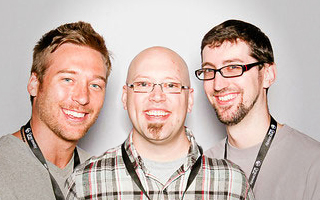
After all, churches are supposedly here to help their members behave as a community. But if you’ve been to church lately, especially a larger church, you might have noticed how easy it is for individuals to slip into the shadows, not really engaging and not having their very concrete social and physical needs met.
[aditude-amp id="flyingcarpet" targeting='{"env":"staging","page_type":"article","post_id":340383,"post_type":"story","post_chan":"none","tags":null,"ai":false,"category":"none","all_categories":"business,social,","session":"C"}']“The biggest churches are the ones that it’s easiest to hide in,” said The Table co-founder Josh Lewis. “My church has 4,000 or 5,000 people. You go in, you sit down, you listen to the sermon, then you drive home. You can get lost in the crowd so easily.”
It’s a problem tailor-made for a social media solution. But churches can be backwards on the tech front, and technologists —
AI Weekly
The must-read newsletter for AI and Big Data industry written by Khari Johnson, Kyle Wiggers, and Seth Colaner.
Included with VentureBeat Insider and VentureBeat VIP memberships.
Well, in Lewis’ words, “I worked at Apple for six years, and there’s a lot of… Well, it’s hard to generalize, but the tech sector is not super religious. There’s kind of a schism.”
So it took a special group of tech folks to make a proper tool for religious and what they call para-religious organizations — community-focused non-profits that need to host online community discussions.
The Table is essentially a white-label, private social network for real-world communities. The idea itself isn’t too new; Yammer does a version of this kind of private social networking for the enterprise.
But Lewis said the nature of The Table’s tools were leading to sharing on a new level — interaction took precedence over self-expression, and anonymous, impersonal feelings within the churches using The Table began to fall away.
“When a church creates a Table, it’s just for members and attendees,” said Lewis. “People behave differently — in a really good way — than they do on Facebook or Twitter. It’s a much more intimate place. Because of that, people will post some really sensitive stuff. It was a big shock initially. The kinds of things that people are posting are things I’ve never, ever seen on more public networks. ‘My marriage is falling apart, I’m strugging with substance abuse, I’m considering suicide.'”
Here’s a look at how The Table works for churches:
[aditude-amp id="medium1" targeting='{"env":"staging","page_type":"article","post_id":340383,"post_type":"story","post_chan":"none","tags":null,"ai":false,"category":"none","all_categories":"business,social,","session":"C"}']
“Using something like this makes it harder to be a stranger and makes you feel more connected,” said Lewis. “We’re all about slaying anonymity and killing apathy.”
While anyone can post anonymously to a Table network, Lewis told us, “People will sometimes consider posting something anonymously and decide to ‘get real’ and be themselves to their church.”
And there’s one other big difference between these networks and the wider web of connections most of us have online. “The people you’re talking to, you’re seeing them within a week,” Lewis explained. “No other social network really works like that.”
In addition to giving church members a space to connect with one another over life concerns, The Table also brings the the Serve App, which allows members to help one another by providing simple services (such as transportation or cooking) and giving, borrowing and lending items.
[aditude-amp id="medium2" targeting='{"env":"staging","page_type":"article","post_id":340383,"post_type":"story","post_chan":"none","tags":null,"ai":false,"category":"none","all_categories":"business,social,","session":"C"}']
“Consumerism in America causes some problems,” said Lewis. “We’ve got so much crap in our houses, and it’s so much cooler to be able to take that and give it away. You could sell it on Craiglist, but there’s something more interesting about making a connection with someone in your community who’s not a total stranger.”
Currently, The Table team has allowed Christian churches to use the software free of charge. Since the application(s) for The Table are, as Lewis said, “so churchy,” the team is working on pay-to-play code licensing and customization with other organizations. “And we’re having internal discussions about whether we’ll serve groups outside churches [such as community centers, LGBT organizations and even community financial institutions], and how that could be done without losing focus on the main idea,” Lewis told us.
“Our team is tiny. We have two developers right now… If we lose focus on what we know — we’re all church people here — the quality of what we’re delivering to the church would drop,” he concluded.
The Table is based in Minneapolis, Minnesota and was founded around the end of 2007.
[aditude-amp id="medium3" targeting='{"env":"staging","page_type":"article","post_id":340383,"post_type":"story","post_chan":"none","tags":null,"ai":false,"category":"none","all_categories":"business,social,","session":"C"}']
VentureBeat's mission is to be a digital town square for technical decision-makers to gain knowledge about transformative enterprise technology and transact. Learn More